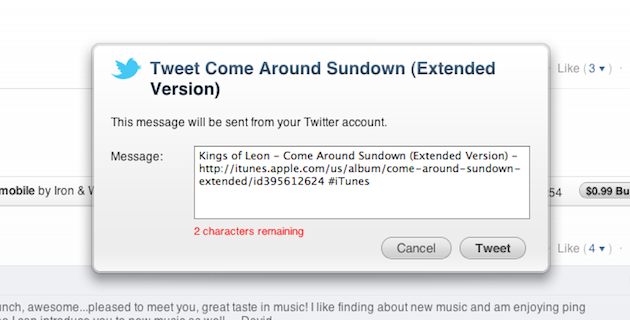 In what feels like a last-ditch attempt to drive up some interest in Ping, Apple has merged its social media-music tool with Twitter. Users with accounts on both sites can now sync them so their activities on Ping will be posted to Twitter, the site announced in its blog. Music reviews along with links to buy the music in iTunes will soon be showing up in tweets. You’ll also be treated to previews of your fellow Twitter users’ Ping updates, previews that will soon be a whole 90 seconds.
In what feels like a last-ditch attempt to drive up some interest in Ping, Apple has merged its social media-music tool with Twitter. Users with accounts on both sites can now sync them so their activities on Ping will be posted to Twitter, the site announced in its blog. Music reviews along with links to buy the music in iTunes will soon be showing up in tweets. You’ll also be treated to previews of your fellow Twitter users’ Ping updates, previews that will soon be a whole 90 seconds.
Apple launched Ping in September, to minimal success. Up until recently, the company has been in talks with Facebook to somehow combine their sites. Even at Ping’s launch, Apple touted that users would be able to link it to their Facebook accounts, which they could – for a day. For one day users could find their Ping friends on Facebook. After that, Facebook removed Apple’s access to its API. There was still hope though. Steve Jobs was reportedly in conversation with Facebook CEO Mark Zuckerberg less than a month ago, and there was speculation the two were mulling over a Facebook-Ping integration. Clearly, that’s all off the table now.
What’s ironic is that Facebook pulled that same rug out from under Twitter. Shortly after Facebook allowed Twitter users to find their friends on Facebook, the social networking site blocked its API. So now, both jilted by Facebook, Apple and Twitter have teamed up. Expect to see Twitter inundated with Ping related updates, as the automatic format when users sign up is for every single bit of activity to be tweeted.
Sooner or later, Apple had to integrate Ping with a more established social networking site. But does Twitter need Ping? The site clearly gets enough traffic as is, which is why there’s speculation the company gets some sort of residual from songs sold through its feature. TechCrunch actually posed that question directly, and more or less were told that’s none of our business.
Editors' Recommendations
- Twitter API broke links, images on the website this morning
- Twitter is officially testing Notes, its long-form blogging feature


